It Was The Journey

Joe’s Brewery, known simply as Joe’s around the University of Illinois, sits at 706 South Fifth Street in Champaign, at the eastern edge of the college-bar hub that lines the town’s main thoroughfare. A faded orange canopy shields the beer garden just outside the door. Inside, a list of 21 burgers makes up a bulk of the dining options. It’s a place packed for $3 U-Call-Its on a weekend and barren at noon on Monday, but on this afternoon in early March, it’s what Jihad Ward wants for lunch.
Champaign-Urbana sits about 140 miles south of Chicago. Outside of the university’s small sphere of population, it’s beset by farmland on all sides. The campus is spacious but not sprawling, bustling in a few areas but quiet in most. In choosing his Division-I home, Ward sought calm, and he knew he’d found it here.
Before coming to play defensive end for the Illini, the north Philadelphia native spent two years at Globe Institute of Technology, a junior college whose campus is situated in New York City’s Garment District only a short stroll from Times Square. His first semester in Champaign, Ward’s walk to practice consisted of the seven-block stretch between Bromley Hall and Memorial Stadium. That’s the same distance from the 28th Street stop on the 1 Train to the Manhattan Mini Storage on the borough’s west side that housed Globe Tech’s practice equipment between sessions. At Illinois, the jaunt from Bromley was the entirety of his daily commute. In New York, snagging his pads from a storage locker was just one leg of an 11.5-mile trip from his school-provided townhouse on Staten Island to practice at the Chelsea Ballfields, which were occasionally unavailable because of a youth soccer practice. Getting there meant a short bus ride, a trip across the Upper Bay aboard the Staten Island Ferry, a quick shot on the 1 through Manhattan, and finally, that relative breeze of a seven-block walk.
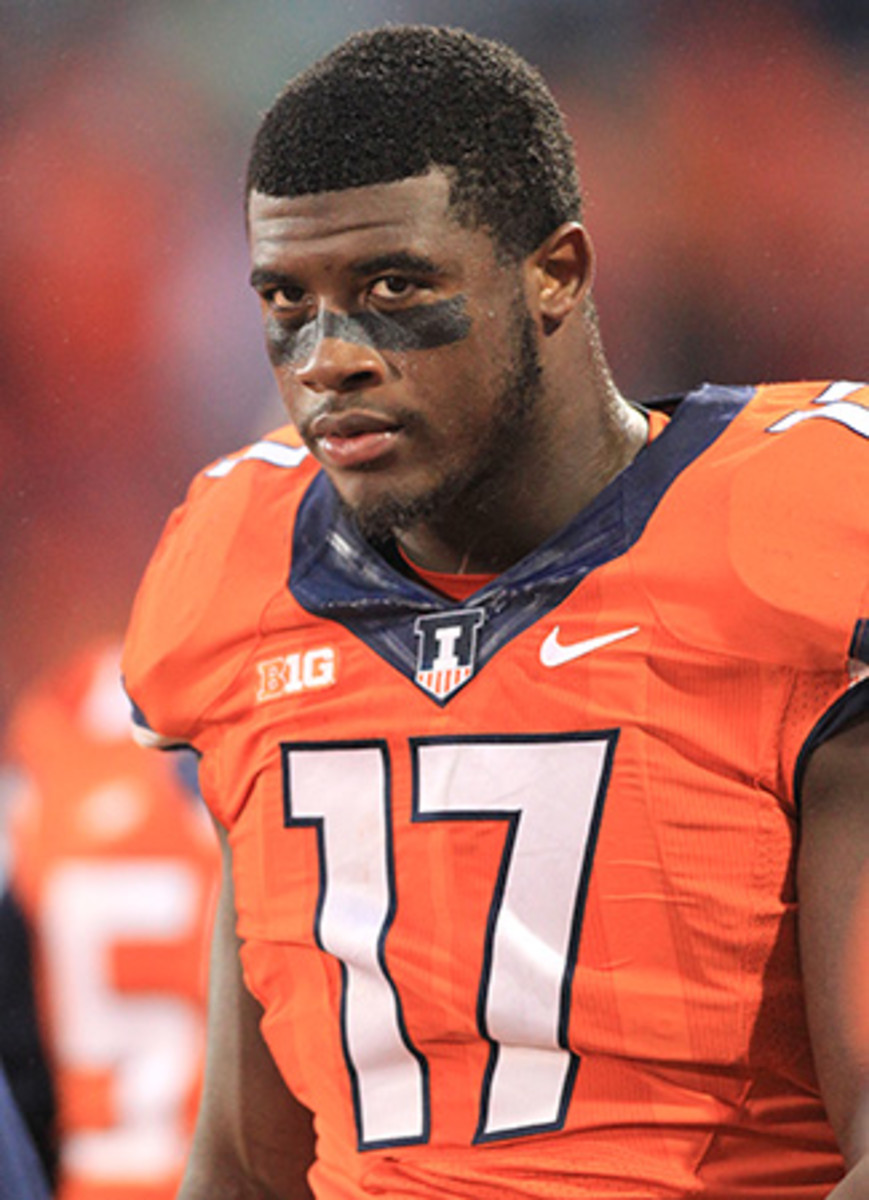
When practice ended, Ward and the Knights lugged their gear back to storage before trudging nearly a mile down 29th Street to a Bally’s Total Fitness near Penn Station for a lift and a shower. Clean but exhausted, they stumbled to classes at Globe, which often ended around 9 p.m. From there, it was a short walk to the 42nd Street station, a subway ride to the ferry, and finally, the slow float back to Staten Island. In all, it was a 24.5-mile round-trip commute—nearly three of those miles on foot—and around 200 minutes in transit over a five-day week.
“That’s why people quit,” Ward says. “They didn’t quit because the team sucks, or this or that. They quit because of the grind.” After two years of that grind, wide-open, slow-paced Champaign felt like a haven. “Here,” Ward says, “there was nothing but quiet.”
As he finishes the thought, Ward—an honest 6-foot-5 and a trim but sturdy 300 pounds, cloaked entirely in charcoal Illinois athletic gear—lifts his burger from its plastic red basket. Ranch and barbecue sauce spill out the sides of the bun. In junior college, players aren’t provided meals. Many of the players at Globe were broke, and finding a next meal wasn’t always certain. Bubba Burgers were the unaffordable item Ward craved enough to pilfer from the nearby grocery store.
Opinions of Ward as a player cover an expanse. His standout week at the Senior Bowl led Mel Kiper to project him as a first-round pick in February. Others see an inexperienced, position-less project that doesn’t deserve a thought in the first two rounds. Ward hasn’t paid much mind to any of the noise. Barely 22, with a patchy beard that betrays a soft but rumbling tenor, his past has purged him of self-doubt. Whatever concerns skeptics have voiced, none of them can touch the ones he’s already faced.
“Somebody complain about food, I’ve been through it,” Ward says. “Somebody complain about traveling, I’ve been through that. Somebody complain about not having a father, I’ve been through that. Somebody complain about violence or shooting, I’ve been through that too. I ain’t afraid of nothing. I’ve been through everything.”
* * *
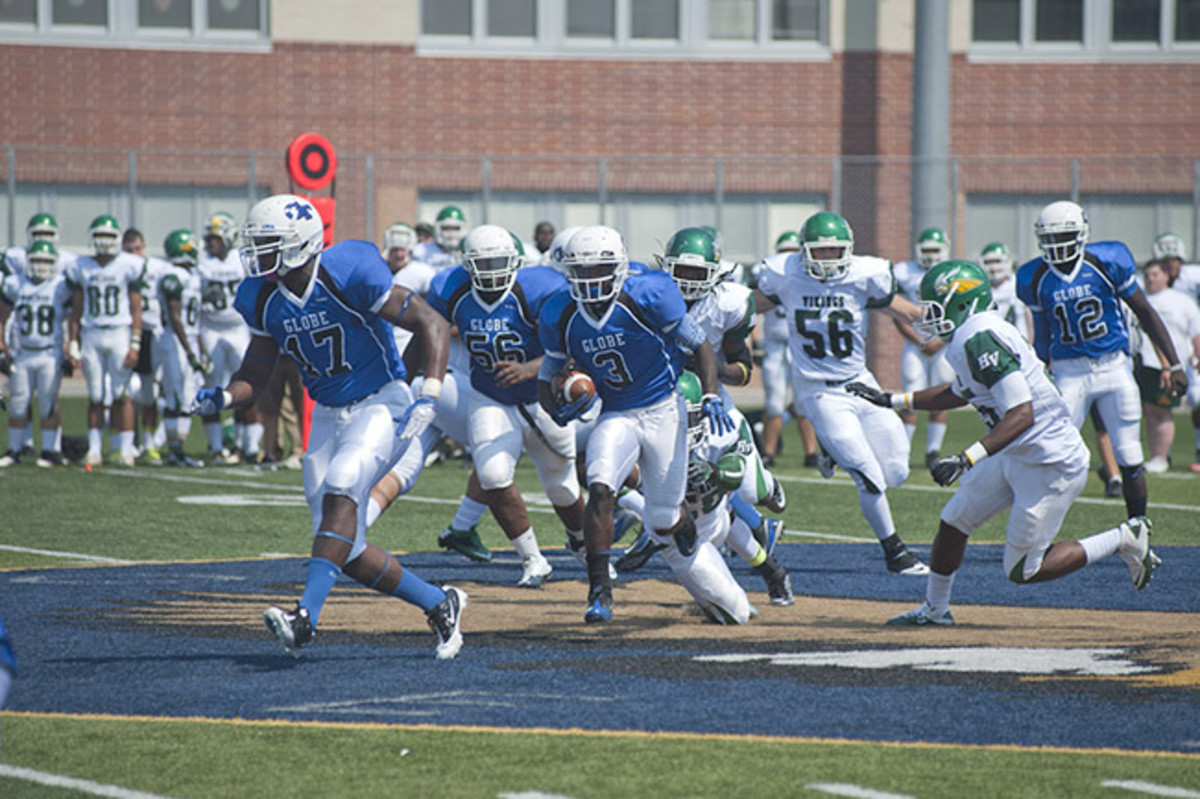
52 Bus to St. George Ferry Terminal // Staten Island Ferry to Whitehall Terminal // 1 Train to 28th St.
Globe Tech’s players were scattered around the boroughs and New Jersey, but for two years, Ward lived with 19 teammates in neighboring two-story townhouses at 104 and 106 Townsend Avenue on Staten Island. A modest $3,000 rent was the appeal of each cream-colored, green-roofed building, where six players inhabited the upstairs with another four on the first floor.
The bus stop was only a few steps down the street, and with two lines running they never waited long. Rides cost $2.75, which many of them simply didn’t have every day. To ensure passage, they deployed an array of tactics. The simplest, because non-college students rode for free, was flashing an old high school ID. As Ward filled out his 6-5 frame, suspicion grew, and when the MTA issued specialized passes for high schoolers, the plan was scrapped. Some mornings, he’d grab a fistful of pennies and toss them in the change slot.
Free ferry rides provided a brief respite, but the real problem waited for them across the water. “We get off the ferry, and now, we have to worry about the train,” Ward says, before pausing. “That’s gonna be tricky.” Subway stations around Whitehall were lined with police, both MTA and NYPD. Initially, says Tyruiq Gordon, a fellow Philly native who was a year ahead of Ward at Globe, they would try to reason with workers, explaining they were willing to give what they had, even if what they had wasn’t enough. “For the most part, they were lenient toward us because of the situation,” Gordon says. “We weren’t just hanging around.” On days when that failed, players would get creative. Even at 280 pounds, Ward would slip into a turnstile with a teammate, conjuring two Metro Card swipes out of one. Like attacking a double team, the key to squeezing onto the subway was getting skinny. “It’s a technique going through them things,” Ward says. In times of desperation, the Knights were left with one final, undesirable option. “If you had to hop, then you hopped,” Gordon says of a move that could come with a $100 fine. “When it came down to it, you couldn’t miss practice or class.”
“You know the movie Warriors?” Ward asks. “We did the same thing.”
Empty pockets hindered travel, but the hardest days were the ones that led to empty stomachs. Groceries came from a now-defunct Waldbaum’s around the corner. On his most desperate days, Ward would haul a duffel bag to the store and collect the cheap essentials—pancake mix, milk, bread—before paying, sneaking back inside, and snagging luxuries like hot dogs and french fries. “He [wouldn’t] eat for two days and not say anything to me,” says Cameron Chadwick, Globe’s head coach. “He was one of those kids, he wouldn’t ask you. He’d just go without.”
During Ward’s first season living at 104 Townsend there were three other players from Philadelphia and six from Hampton Roads, Va. Those shared roots created the earliest bonds, but it was hunger—both for food and a future—that ultimately fused them. Gordon and others showed Ward the way that year, and when they were gone, the mantle was his. “It’s not really teaching someone,” Ward says. “You just see it. We’ve got each other’s back.”
For Chadwick, Ward became another set of eyes when he couldn’t be around. If the house wasn’t clean or neighbors complained about noise, he knew to call his Pied Piper, the guy who rounded up players, got them fed and to practice every day. That year, fellow Philadelphian Tyrin Stone-Davis was 3,000 miles away at Pierce College in Los Angeles, but when he joined Ward at Illinois, he felt the same pull. “Just his presence, period,” Stone-Davis said of Ward’s influence. “He just leads by action, and people rally behind him.” Stone-Davis is nearly a year older than the man he now describes as his brother, but that never mattered. There was comfort to be found in Ward’s quiet ambition, and Stone-Davis clung to it. He still does. “I just feel safe around him,” Stone-Davis says. “He never lied to me. He’s never done me harm. I trust him. I love him. He wants the best for me.
* * *
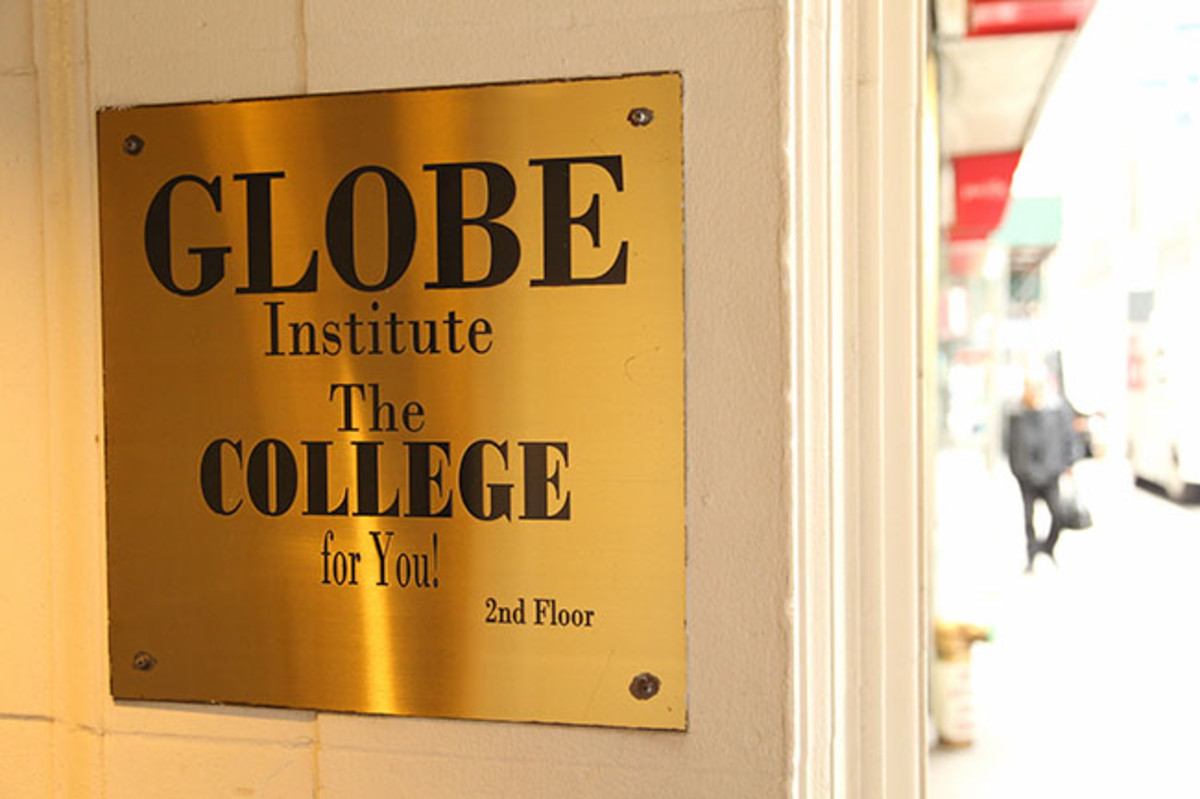
Walk from 28th St. to Manhattan Mini Storage (29th St. and 11th Ave.) to Chelsea Ballfields (28th and 10th)
The Chelsea Ballfields are a fenced-in artificial surface near the High Line, outfitted with a track, backstop, and soccer fields. And during Ward’s first season at Globe, in the fall of 2012, it’s where the team held most of its practices. Compared to the arduous walk from the storage unit to De Witt Clinton Park on 52nd Street in Hell’s Kitchen, home to spring practices that year, the two blocks felt like nothing to veterans like Gordon. When Chadwick ran into scheduling conflicts, he’d sometimes audible to Pier 40, at a field that adjoins a trapeze school, but that season Globe Tech football called two main locations home: practices in Chelsea, games at Union City High School in New Jersey, on a roof surrounded by a net to keep balls from plummeting off the side.
Next to the turf patch at the Ballfields sit a trio of basketball courts, much like the ones where Ward spent most of his childhood. Kareema Ward is a single mother with five children. “Jihad” was the name of a childhood classmate, and it would become the name of her first child. There was no religious connection at the time—Kareema didn’t convert to Islam until 11 years ago, long after Jihad was born—but her education as a Muslim has brought new meaning to his name. In her purse, she carries a piece of lined notebook paper with 17 highlighted Islamic phrases, a constant resource for lessons she’s still learning. She knows what most will think. They hear “Jihad,” all they imagine is decrees of holy war and violence. But jihad can also mean to strain, to strive, to persevere. Now, when Kareema hears her son’s name, she thinks of all he’s done in his own struggle.
Until age 14, he’d never played a down of organized football. Before his sophomore year at since-closed Edward Bok Technical High School, the basketball coach approached Frank Natale, then in his first-year as Bok’s head football coach, about a tall, muscular basketball player he thought would fit with Natale’s plans. That summer, a 6-foot-3, 240-pound Jihad Ward was getting snaps for the Wildcats at wide receiver and safety. “He was 6-4 at D-back wearing no. 84,” laughs Gordon, who played running back for nearby University that year. “He looked out of place.”
Apocryphal tales have emerged about Ward’s positional history, in the way they do about players who’ve spent time on the outskirts of college sports before ending up at a major program. He’s only played defensive line for three years is a tempting way to inflate Ward’s potential. It’s also not true. He spent his second season as a standup end in Natale’s 5-2 defense, and with an eye on getting Ward’s hand in the dirt, Bok transitioned to a 4-3 when he was a senior.
Ward was second-team All-City as a junior, but Division I interest ended before it could start when coaches learned about his grades. Natale ensures that Ward was a fixture in class, but still, his GPA hung just below 2.0. Chadwick, who’d been named Globe’s head coach the previous year, had history recruiting in Philadelphia, and eventually he and Natale got in touch. He made the trip to see Ward play at an all-star game at Lincoln Financial Field, but he’d been sold long before. Players built like that don’t land in junior college. A defensive end from the start at Globe Tech, Ward played well enough for his teammates to elect him a captain the spring following his freshman season.
Eight hundred fifty miles away, Bill Cubit was one of several members of the Illinois coaching staff scouring JUCO tape for defensive linemen. Poring through his Hudl account, Cubit, a Philadelphia native, came across a tape from a school he’d never heard of. He might have kept going if not for seeing his hometown next to the player’s name. A few plays on the grainy tape were all Cubit needed.
Cubit reached out to Ward through Illinois’s Twitter account and passed along his number. His first question after Ward called was a crucial one: American cheese or Cheez Whiz? Silence followed.
“On your cheese steak,” Cubit said.
A short pause.
“American cheese.”
Cubit was satisfied.
* * *
Until Ward came to Illinois that fall for his official visit, the only proof Cubit had that he even existed was shoddily recorded game footage and a voice on the other end of the phone. There was more evidence that the Loch Ness monster is real. The day before Illinois’ game against Wisconsin, a hulking figure walked into a banquet room at Champaign Country Club for the team’s Friday meal. “When he walked through the door, I was as relieved as anybody,” Cubit says. “And I turned to somebody and said, ‘Now that’s what they’re supposed to look like.’”
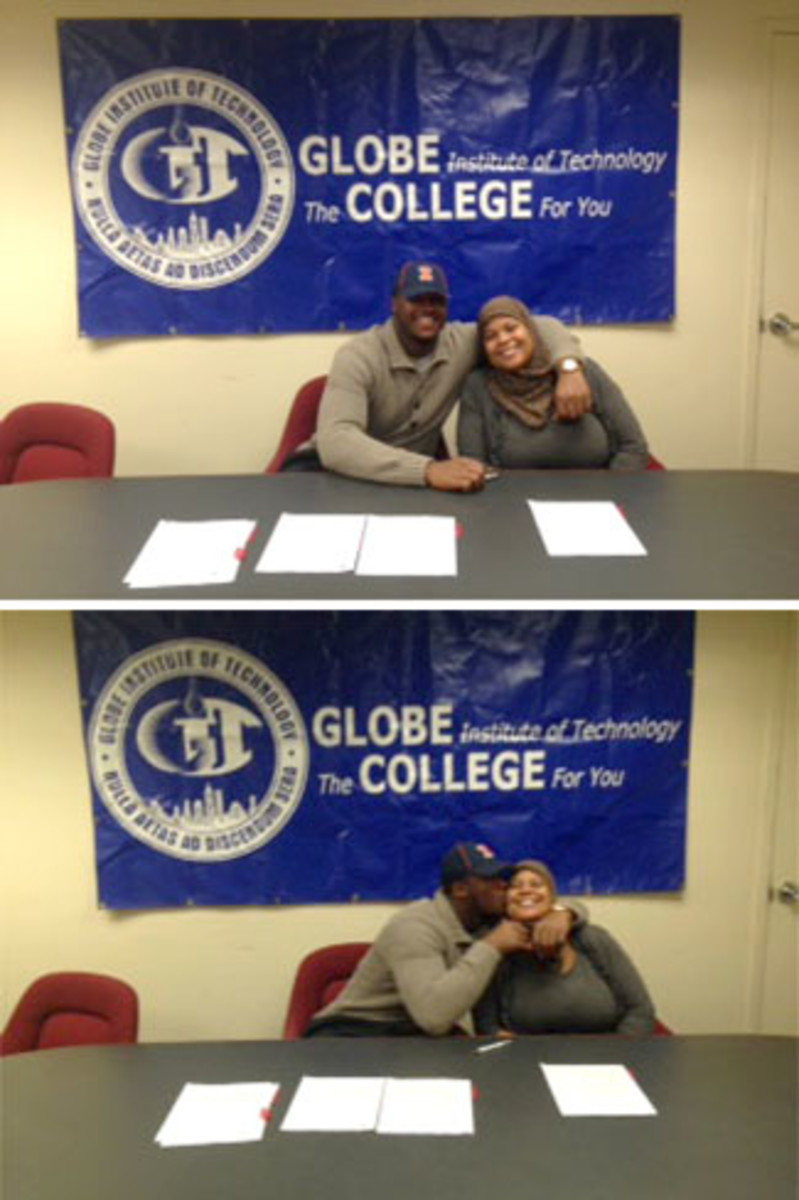
A handful of schools pursued, but Illinois is where he felt wanted most. Along with a reprieve from life in New York, Ward yearned for people who cared. He didn’t always have them growing up in Philadelphia. When he was 17, a paternity test revealed that the imprisoned man he thought to be his father was not. Jihad eventually did get in touch with his dad, and when his family threw a party to celebrate his acceptance to Globe, he extended an invitation. The man arrived with the smell of beer lingering on his breath and handed his son a congratulatory $20 bill. Ward hasn’t seen him since.
In Philadelphia, distrust and dismissal seeped into all of life’s cracks. With Cubit at Illinois, there was support, a shared vision. “He told me the other day, ‘You can’t feel money,’” Kareema says. “But you can feel when someone loves you.”
Ward’s first padded practice in Champaign was the second day of the team’s fall camp. He knew how established, pedigreed Division I might view a JUCO castoff, and from the start, he wanted to announce his presence. A broader goal came with it, though. “When I do a rep against people, when I get off the ball, people feel me,” Ward says. “I don’t say much, but people feel me. “You’re going to feel how I felt for those two years, through my whole life.”
Practice started with an inside run drill, the linemen, linebackers, and backs gathered on one side of the field. On the first snap, Ward knifed into the backfield and buried running back Donovonn Young into the turf. Stone-Davis was across the indoor facility with the rest of the wide receivers. “All I heard was Wooooo! Woooo!” Stone-Davis says. “Everybody just turned their head and looked.” What they saw was Ward, letting out an out-of-character roar in Young’s face as he was peeled off the ground. “He felt like he’d arrived,” Stone-Davis says.
Illinois was thin on the defensive line, and co-defensive coordinator Tim Banks says the staff did all they could to get Ward ready to play early that season. “I think we knew after the first practice,” Banks says. “This kid was freakish, in terms of his movements. And he went hard.” By the fourth game of the season, an injury made Ward one of the Illini’s starting defensive ends.
He remained there all year, earning Honorable Mention All-Big Ten along the way, but when new defensive line coach Mike Phair arrived the following spring, he quickly developed grander plans. Like many who’d only seen him on film, Phair was jarred by Ward’s size in person.
He saw a player that even at 6-foot-5 had the flexibility to maintain pad level and keep leverage. Throughout the spring, he experimented with Ward inside, where the quickness and length that allowed him to survive on the edge became an even more significant advantage against interior offensive linemen. “He’s dangerous there,” Phair says. “I thought he could really cause some problems for an offense. And I thought he did a really good job learning how to play those spots inside.” A bump to tackle was just another course in Ward’s rapid defensive line education. Those practices would be his only spring football experience in major college football, and that lack of background is what has teams intrigue about his room for growth. “I’m just now learning techniques and schemes,” Ward says. “Getting off the ball, getting vertical, those types of things.”
By the time Illinois played Iowa in its sixth game of the season, Ward was playing a considerable portion of his snaps at defensive tackle, and that week is when Phair saw it all coalesce. Ward finished that game with 11 tackles, including nine solo. In years past, players that appeared to fall between the cracks of positional designations were downgraded for it. Now, with stars like Muhammad Wilkerson, Calais Campbell, and Jurrell Casey blurring lines and erasing ballcarriers, versatility is en vogue. Phair spent five years as an NFL defensive line coach before arriving in Champaign, and when looks at Ward, he sees an instant pro. “It won’t surprise me when he plays right away for whoever drafts him,” Phair says.
* * *

Walk from Bally’s Total Fitness to Globe Institute of Technology (38th St. and 7th Ave.)
Globe’s entrance is on 38th Street. Wedged between two stores specializing in rhinestones and beads, “Garment Center Capitol” is carved into the stone above the door. When Cubit visited, following Illinois’s 2013 season, he thought he was lost. Ward’s thoughts were even blunter: “I was like, ‘This is the school?’”
The school is three floors of beige walls, with a few rows of computer paper reading “Welcome to Globe Institute of Technology” taped behind a receptionist’s desk acting as a banner. The rounded letters are filled in with black marker. It’s a tough sell for head coach Cameron Chadwick, and he knows it.
Chadwick is from Union, N.J. A high school star, poor grades made junior college his only outlet after graduation. He landed at Nassau Community College, and from his housing in Hempstead, the trudge to the Garden City campus was more than 3.5 miles. After two seasons, he transferred to Rutgers, where he played defensive back under head coach Terry Shea. Three years with NFL Europe’s Prague Panthers followed, and after a short stint in real estate, Chadwick felt the pull of coaching. He was hired as Globe’s defensive coordinator in 2008 before finally taking the head job in 2011. “I feel like this is where I belong,” Chadwick says. “I was [these players] 20 something years ago.”
The main sales pitch for Globe Tech is two-prong. Prong 1 starts—and ends—with the chance to attend school in New York City. Prong 2 is about how much it costs. Last season, Globe’s opponents included Stevenson College, Dean College, and Albright College. The average yearly tuition for those three schools is $33,000 a year. Lackawanna and Albright are considerably more affordable, but neither gets to Globe’s annual asking price: $11,000.
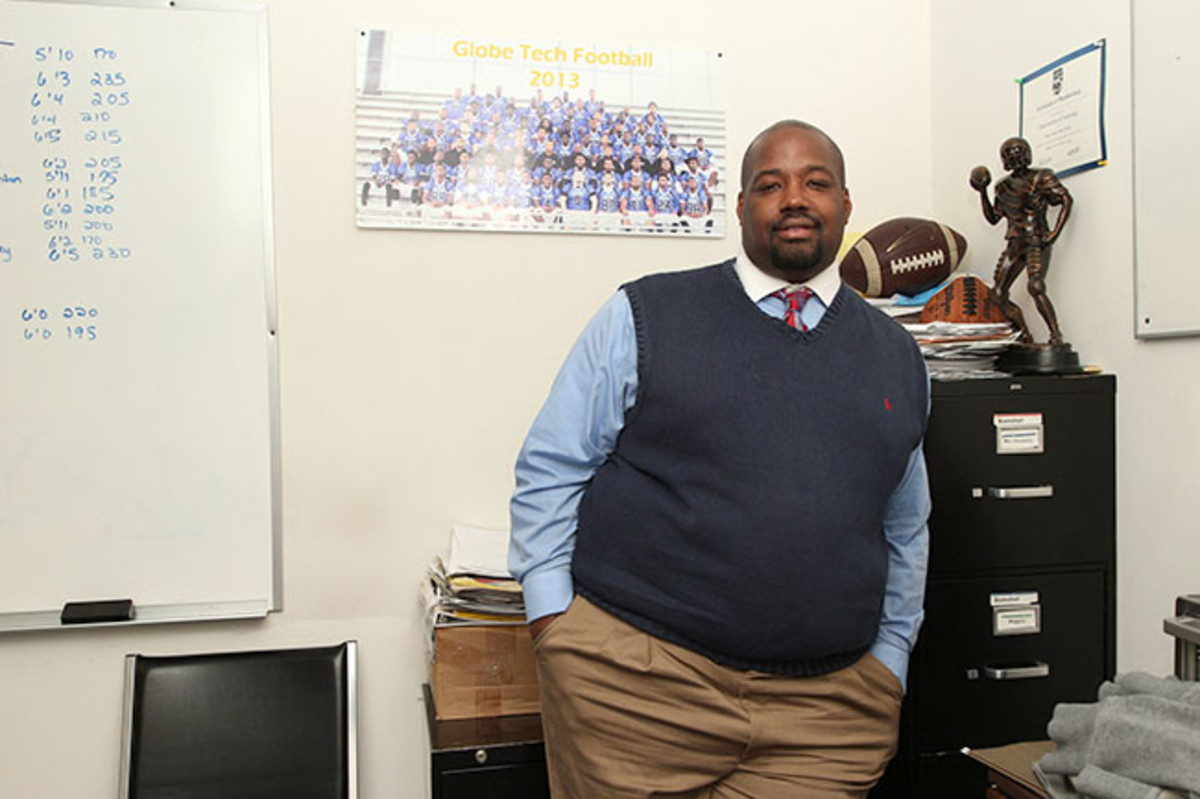
Getting players to campus is a start, but keeping them is far from a certainty. In those days, with the trek to and from Manhattan, Chadwick estimates that he lost about the half the players he’d recruited before the season. “You take an 18-year-old kid straight out of high school, stick him in the heart of New York and say, ‘OK, now you have to do everything yourself,’” Gordon says. “It was definitely a shock.” The travel was a deterrent for some of Ward’s teammates, but what sent many of them scurrying was learning that a portion of their credits wouldn’t pass NCAA compliance. Following his freshman year, Washington, Tennessee, Kentucky and Illinois all showed interest in Ward, but some balked at Globe’s accreditation.
Chadwick ensured that all they needed was additional course materials, and the concerns would be alleviated, but Ward saw it as another rejection. He was devastated. All those hungry nights, all the cunning work to make his way onto the train, all his success on the field, it had been in vain. “It really hurt me because I busted my ass to be where I was,” Ward says. “I was so excited that I had a full scholarship somewhere.” Chadwick did what he could to calm the unrest, and in time, Illinois was able to accept enough of Ward’s credits to accept him. After coming to Globe Tech with a 1.8 GPA, he left with a 3.4, and he’s on track to finish his degree at Illinois in sports management this spring.
Conference room 409, where Ward signed his letter of intent, has been unchanged since. An old Dell desktop sits in one corner, a black file cabinet in another. Two posters—an eagle for “Leadership” and group of cyclists for “Perseverance”—hang on adjacent walls. A blue Globe Tech banner fills out another, behind the long table where Ward put pen to paper. Documenting it all was Chadwick with a cell phone, the signing day cameras a world away. “After we signed him, [Jihad] must have thanked me for five, six weeks, for giving him the opportunity,” Cubit says.
Even now, as Ward spends more time with former college stars entrenched in the same stretch of their lives, he can’t believe what he hears. He never says anything, content to keep his head down and his mouth closed as he plugs away. Quietly, he’s incredulous. “It’s a regular day to them,” Ward says. “It’s not a regular day to me. I’d never had a practice on no college football field, in a big stadium.” He says the moment he arrived at Illinois, he knew this was the future. The hardest days were behind him. But even now, short clips will land in Cubit’s text messages, of Ward alone in the practice facility. “He could be a $100 million man, and he’d still feel like he’s worth a penny,” says Stone-Davis. “That’s Jihad.”
* * *

Walk from Globe Tech to 42nd Street/Times Square // 1 Train to Whitehall Terminal // Staten Island Ferry to St. George Ferry Terminal
Tourists lingered in Times Square long after the 9 p.m. let-out time for Globe’s classes, but the worst of the noise was long past. After another adventure to secure a seat on the train, Ward arrived at Whitehall Terminal and waited for the next ferry back to Staten Island. Sitting on the hard plastic seats of the ferry, he’d pass the Statue of Liberty, softly lit from below as a few straggling tourists gathered near the window to snap a picture.
“Like I tell everybody,” Ward says, “I just want peace at the end of the day.”
He found it at the end of every night in New York, but at Illinois, he discovered it in every aspect of his day. He knows football has changed has life, but he doesn’t deny he’s the one that allowed it to.
“There was so much stuff happening in my life. There’s always something trying to break you down,” he says. “But I made it through.”
The only sound on the ferry was the low hum of the engine. It was a calming churn. Staring out the window, he saw the soft light on the Lady to which so many began anew. When he looked into the sky, he saw hope.
